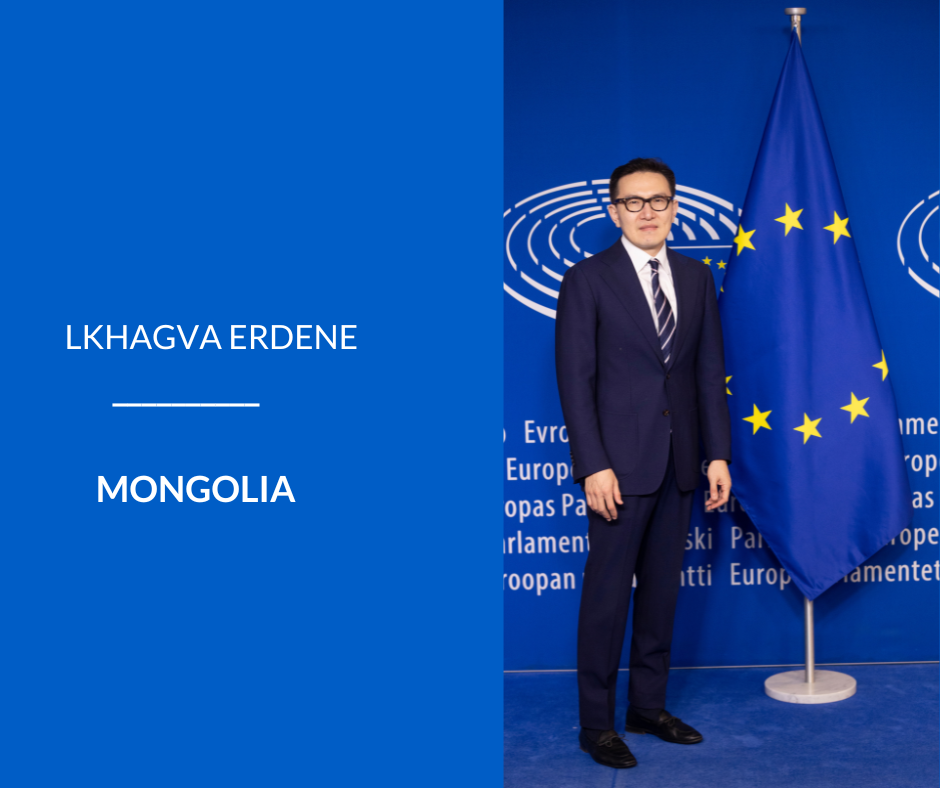15,000 Steps in Brussels: Five Takeaways from the Capital of Parliamentary Democracy
A Mongolian Perspective
By Lkhagva Erdene
12 years after my last visit, I returned to Brussels in May 2025, walking 15,000 steps daily for a week as part of the EU Visitors’ Programme (EUVP), which has been run for over half a century. Under rare sunny skies, I traversed cobblestone squares and verdant parks, visiting EU institutions and engaging with policymakers. This journey left me with new friendships, fresh ideas, and a firm conviction: when parliaments work diligently, they can forge compromises that pave the way for a brighter future for Europe and its global partners, including Mongolia. Here are my five key takeaways from the capital of parliamentary democracy.

1. Reinventing Citizen Engagement
Trust in governments is at an all-time low, with just over half of EU citizens expressing dissatisfaction with how democracy functions in the EU in 2023. In Mongolia, similar challenges fuel populist and nationalist sentiments, underscoring the need for robust public engagement. During meetings with the Directorate-General for Communication (DG COMM), I explored innovative tools like the European Citizens’ Panel, Citizens’ Engagement Platform, and European Citizens’ Initiative. These platforms prioritise inclusive dialogue, inspiring me to strengthen citizen consultation mechanisms at Mongolia’s State Great Hural. Despite budget constraints and limited staff, parliaments worldwide must move beyond reaching disengaged communities to delivering meaningful participation. By fostering two-way dialogue, we can rebuild trust and ensure citizens’ voices shape policy, a lesson Mongolia must embrace to deepen democratic engagement.
2. Combating Disinformation Together
The World Economic Forum’s Global Risk Report ranks disinformation as a top threat, just behind global conflict and extreme weather. It erodes trust, exacerbates societal divisions, and undermines democratic institutions. The European External Action Service (EEAS) has taken a leading role with initiatives like EUvsDisinfo and reports on Foreign Information Manipulation and Interference Threats. However, these efforts could be enriched by contributions from neutral actors, such as Mongolian civil society organisations. In Mongolia, disinformation surges during election cycles, often fueled by foreign interference. Collaborating with global partners like the EU can help us develop strategies to counter these threats, ensuring our information landscape remains resilient and trustworthy.
3. Shielding Mongolian Democracy
Mongolia must protect its democracy, sometimes from internal challenges, by prioritizing civic engagement, accountability, equality, and the rule of law. Empowering civil society to participate in legislative agendas and supporting media viability are not just goals—they are imperatives for good governance and sustainable development. The EU’s leadership in regulating Big Tech’s role in amplifying disinformation offers a model for Mongolia. We must better understand how algorithms amplify coordinated manipulation and explore regulatory measures to address profiling and content amplification. By placing citizens’ voices at the heart of decision-making, Mongolia can strengthen its democratic institutions and foster shared prosperity.
4. Building a Strategic Economic Partnership
Mongolia’s economic future hinges on creating a transparent and predictable environment to attract foreign investment. Simultaneously, the EU seeks to secure alternative supply chains for critical raw materials. A mutually beneficial partnership can address these needs. Through initiatives like the EU’s Global Gateway, both sides can expand Mongolia’s export markets, diversify its energy mix, and reduce reliance on Russian fuel and unsustainable coal use. By aligning economic diversification goals, Mongolia and the EU can build a resilient, sustainable partnership that supports long-term prosperity.
5. Expanding People-to-People Exchanges
Mongolia’s vast natural resources often overshadow its human capital. To strengthen ties, the EU should invest in public sector technical assistance, support anti-corruption and transparency initiatives, and expand people-to-people exchanges. The small but growing Mongolian diaspora in Europe, including second-generation immigrants working in EU institutions and companies, is already bridging our nations. By facilitating cultural and educational exchanges, the EU can help Mongolia nurture a stable, democratic future as a strategic partner.
Walking Brussels’ vibrant streets, I saw a shared vision: through collaboration, Mongolia and the EU can build a democratic, prosperous future grounded in mutual respect and shared values.
Lkhagva Erdene is Deputy Head of Secretariat at the State Great Hural (Parliament) of Mongolia. A former journalist and Editor-in-Chief of MongoITV, he also served as General Manager of External Affairs and Communications for the Oyu Tolgoi project.
